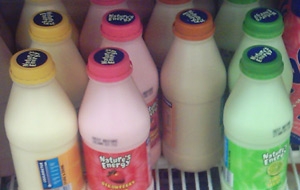
There has been much talk about flavored milk in recent months, and much of this debate has been fueled by Jamie Oliver who has a popular television show, Jamie Oliver’s Food Revolution, on ABC. His goal is simple: "To revolutionize school lunches to save the health of America’s next generation." Oliver launched a “sugary milk campaign” back in April, 2011. The purpose of the campaign is to ask schools to promote plain white milk instead of flavored milks. According to Oliver’s website, “chocolate milk has the same amount of sugar as a soft drink and just one additional soft drink per day increases a child’s obesity risk by 60 percent and is a major contributor to Type 2 diabetes.”
Well before Oliver emerged on the scene, people have debated the merits of offering flavored milk in the school lunch program. Chocolate (the most common), strawberry, vanilla and other interesting flavors are widely available in districts across the country. The milk provides essential nutrients, but with that comes added sugars that contribute extra calories to the diet – something most American children do not need.
Is there a place for flavored milk on the school lunch tray?
According to the American Dietetic Association, the Dairy Council and other health and nutrition organizations – the answer is yes.
Supporters of flavored milk in schools argue that it provides nine essential nutrients – unlike sodas and other sweetened beverages that offer no nutritional benefit besides extra calories.
According to the American Dietetic Association, leading health and nutrition organizations (including the American Academy of Family Physicians, American Academy of Pediatrics, American Heart Association, National Hispanic Medical Association, National Medical Association and School Nutrition Association) recognize the role that low-fat or fat free milk (including flavored milk) plays in helping kids achieve daily dairy serving recommendations. According to the ADA, kids will drink more milk when it’s flavored and kids drink less milk (and get fewer nutrients) when flavored milk is taken away.
The Diary Council offers an overview for school nutrition professionals in favor of flavored milk on the lunch tray. The Dairy Council of California argues that we cannot forget flavored milk has both natural sugars (lactose) and added sugar, and the amount of high-fructose corn syrup added to flavored milk is much less than the amount added to sugary beverages like soda or other processed foods. Additionally, some studies suggest that kids who drink flavored milk are less likely to consume soda and other sugary beverages, they consume more nutrients and are more likely to maintain a healthy body weight.
Where does LAUSD, the school district placed at the center of this debate, stand?

The burning question we all want to know the answer to now is, will LAUSD students switch over to low fat or fat free plain milk when chocolate or strawberry milk is no longer available in the fall? The answer will be very interesting and perhaps will put an end to the great flavored milk debate!